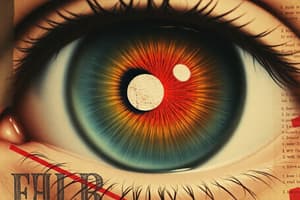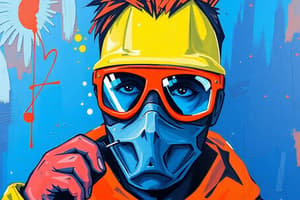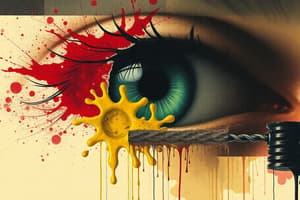Podcast
Questions and Answers
What should be done if a skull fracture is suspected in a scalp wound?
What should be done if a skull fracture is suspected in a scalp wound?
- Apply pressure around the edges of the wound to control bleeding (correct)
- Apply a cold compress to the wound
- Apply pressure directly on the wound to control bleeding
- Keep head and shoulders slightly elevated
How should scalp wounds be managed if bleeding continues?
How should scalp wounds be managed if bleeding continues?
- Add dressings over the first dressing (correct)
- Apply pressure directly on the wound
- Keep head and shoulders slightly elevated
- Apply a tourniquet above the wound
What action should be taken if a scalp wound exhibits significant facial damage or signs of concussion?
What action should be taken if a scalp wound exhibits significant facial damage or signs of concussion?
- Apply a cold compress to the wound
- Apply pressure directly on the wound
- Keep head and shoulders slightly elevated
- Call 9-1-1 (correct)
Why is it important to keep the head and shoulders slightly elevated if no spinal injury is suspected in the case of a scalp wound?
Why is it important to keep the head and shoulders slightly elevated if no spinal injury is suspected in the case of a scalp wound?
What is the recommended action for a knocked-out tooth if unable to reimplant it?
What is the recommended action for a knocked-out tooth if unable to reimplant it?
What should be done for an infected or abscessed tooth?
What should be done for an infected or abscessed tooth?
What are the symptoms of a cavity?
What are the symptoms of a cavity?
What is the recommended action for bleeding from the mouth due to a cut through the lip?
What is the recommended action for bleeding from the mouth due to a cut through the lip?
What can result if a broken vertebra pinches spinal nerves?
What can result if a broken vertebra pinches spinal nerves?
What should be done for an unresponsive person with signs of a spinal injury?
What should be done for an unresponsive person with signs of a spinal injury?
What should be done for a reliable person without signs of a spinal injury?
What should be done for a reliable person without signs of a spinal injury?
What should be done for an unreliable person with signs of a spinal injury?
What should be done for an unreliable person with signs of a spinal injury?
What is the recommended action for a reliable person with signs of a spinal injury?
What is the recommended action for a reliable person with signs of a spinal injury?
What should be done if a reliable person exhibits back pain and leg numbness?
What should be done if a reliable person exhibits back pain and leg numbness?
What is the recommended action for a reliable person who is alert, has no neck pain or neurologic symptoms, and is able to move fingers and toes?
What is the recommended action for a reliable person who is alert, has no neck pain or neurologic symptoms, and is able to move fingers and toes?
What is the recommended first aid for a loose object in the eye?
What is the recommended first aid for a loose object in the eye?
How should a cut or scratch on the eyeball or eyelid be managed?
How should a cut or scratch on the eyeball or eyelid be managed?
What is the recommended first aid for chemical exposure to the eyes?
What is the recommended first aid for chemical exposure to the eyes?
What is the recommended action for an eye avulsion (eye knocked out of socket)?
What is the recommended action for an eye avulsion (eye knocked out of socket)?
What is the recommended first aid for burns to the eye caused by light exposure?
What is the recommended first aid for burns to the eye caused by light exposure?
What are the symptoms of conjunctivitis?
What are the symptoms of conjunctivitis?
What is the recommended first aid for conjunctivitis?
What is the recommended first aid for conjunctivitis?
What is the recommended action for subconjunctival hemorrhage?
What is the recommended action for subconjunctival hemorrhage?
What should be done for a subconjunctival hemorrhage that occurs due to violent sneezing?
What should be done for a subconjunctival hemorrhage that occurs due to violent sneezing?
How should penetrating eye injuries involving long objects be stabilized?
How should penetrating eye injuries involving long objects be stabilized?
What is the recommended first aid for a cut or scratch on the eyeball or eyelid?
What is the recommended first aid for a cut or scratch on the eyeball or eyelid?
Flashcards are hidden until you start studying
Study Notes
Eye Injuries: First Aid and Treatment
- Eye injuries require immediate examination by an ophthalmologist or physician.
- Symptoms of a blow to the eye include double vision and inability to look upward, often resulting in a black eye.
- For a loose object in the eye, blinking, gentle irrigation with water, and lifting the upper eyelid may help remove it.
- A cut or scratch on the eyeball or eyelid should not be pressured; both eyes should be covered with gauze pads, and emergency services should be called.
- Penetrating eye injuries involving long objects should be stabilized with padding and a shield, while short objects require a doughnut-shaped pad and a bandage to hold it in place.
- Chemicals in the eyes should be flushed with warm water for at least 15 minutes and loosely bandaged if necessary, with a poison control center contacted.
- In the case of eye avulsion (eye knocked out of socket), the eye should be covered loosely with a sterile dressing moistened with clean water, and emergency services should be called.
- Burns to the eye caused by light exposure require covering both eyes with moist, cool cloths and seeking medical advice.
- Symptoms of conjunctivitis include redness in the white part of the eye, itching, oozing discharge, excessive tearing, swollen eyelids, and discomfort from bright lights.
- For conjunctivitis, cool compresses and artificial tears can be applied, with professional medical care sought if symptoms do not improve after 3 or 4 days.
- Subconjunctival hemorrhage, characterized by a red patch or large area of redness in the white part of the eye, does not require treatment and should not be treated with over-the-counter eye drops.
- Subconjunctival hemorrhage may occur due to violent sneezing, bowel movements, or lifting heavy weights and may not cause pain, visual changes, tearing, irritation, itching, or discharge.
Studying That Suits You
Use AI to generate personalized quizzes and flashcards to suit your learning preferences.



